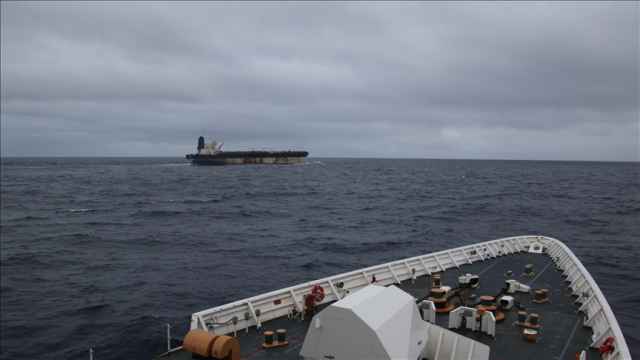Traffic jams, potholes, snail-paced trains and flights that do not connect are top of the list of frustrations for Russia's businessmen as they try to move goods and people across nine time zones.
The world's largest country is one of the top exporters of oil, gas, grains and metals. Yet it carries less freight by rail today than it did in the Soviet era.
"Russia is a global treasure trove of natural resources," said Andrei Filatov, a co-owner of infrastructure group N-Trans who has interests in rail freight, ports and construction.
"The world's population is growing, and it will need raw materials … But the materials cannot be shipped out. Why? Ports are closed and railway yards have not been built," Filatov said.
Outside the main cities of Moscow and St Petersburg, roads are often rutted, airports dilapidated and trains jammed up in bottlenecks.
The Transport Ministry estimates that poor roads mean economic output is 7 to 9 percent lower than it could be. Freight trains travelled at an average speed of less than 10 kilometers per hour last year, a 15-year low.
"The two biggest cities in the country are not even joined by a decent road … You do not need to discuss this, you need to get on with it," Filatov said.
Critics point to corruption and cost overruns in projects. One of Russia's most ambitious infrastructure programs is for the 2014 Winter Olympics, set to open Feb. 7 in the Black Sea resort of Sochi.
The cost of hosting the games is expected to rise to $50 billion, much more than expected initially and more than any other Olympics. Much of the city and Olympic village currently resembles a muddy construction site.
The legacy of graft and shoddy execution makes many investors wary of new infrastructure projects, especially those accustomed to the huge returns offered by other sectors, such as energy and minerals.
"I do not see any big problems with the investment climate. I see problems with the attractiveness of investment projects," said Mikhail Shamolin, chief executive of Russian oil-to-telecom group Sistema. "The question is whether there is a business opportunity in which to invest, and invest with a good return."
Many investors in state-led projects cultivate close ties to state officials as a way to safeguard their investments.
The barrier to growth caused by creaking infrastructure has been recognized by President Vladimir Putin, who unveiled a $13 billion investment plan to build new roads and railroads at an economic forum in June.
He promised to build a new motorway around Moscow, upgrade the Trans-Siberian Railway in the Far East and build a high-speed rail line from the capital to Kazan, some 800 kilometers to the east.
Constraint To Business
Businessmen say the decrepit infrastructure is a barrier to growth, especially in a vast country where a shrinking labour force will need to become increasingly mobile to be productive.
Mikhail Khabarov of A1, the investment vehicle of Mikhail Fridman's Alfa Group, finds it hard to get to the Kemerovo region, where his group is involved in a coal business. Better flight connections between regional cities would help, he says.
"This is the issue of my time's efficiency," Khabarov said. "Regional aviation is a significant constriction on the development of business relations."
Russia ranked 102nd on the World Economic Forum's 2013-14 Global Competitiveness Report in terms of quality of air transport infrastructure, 88th on port infrastructure and 136th for the quality of its roads.
A KPMG analysis in 2012 of the relative costs of doing business in 14 countries in the Americas, Europe, and Asia Pacific gave Russia the second-lowest score for its distribution infrastructure, behind China, India and Mexico.
Rail logjams can hit business. Hundreds of railcars loaded with naphtha and fuel oil were blocked for days on their way to Russia's Pacific port of Vanino earlier in the year due to bad weather and traffic bottlenecks.
State-owned Russian Railways, which controls 85,000 kilometers of railways, has for years complained about a lack of funding, particularly to boost its capacity to export goods to growing markets in the Asia-Pacific.
Yet the country has announced plans to cap tariffs on regulated services, including railroads, in order to ease pressure on household and company budgets. Tariffs were previously indexed at about the level of inflation.
The parlous state of infrastructure offers huge investment opportunities that could release economic potential as long as structures such as concessions can be made to work.
Ivan Shabalov, owner of trading firm Pipe Innovation Technologies, said a pipeline planned by state gas export monopoly Gazprom to pump East Siberian gas to the Pacific port of Vladivostok would drive regional development.
"One ruble invested in the pipeline is worth seven rubles invested in the economy," Shabalov said.
A Message from The Moscow Times:
Dear readers,
We are facing unprecedented challenges. Russia's Prosecutor General's Office has designated The Moscow Times as an "undesirable" organization, criminalizing our work and putting our staff at risk of prosecution. This follows our earlier unjust labeling as a "foreign agent."
These actions are direct attempts to silence independent journalism in Russia. The authorities claim our work "discredits the decisions of the Russian leadership." We see things differently: we strive to provide accurate, unbiased reporting on Russia.
We, the journalists of The Moscow Times, refuse to be silenced. But to continue our work, we need your help.
Your support, no matter how small, makes a world of difference. If you can, please support us monthly starting from just $2. It's quick to set up, and every contribution makes a significant impact.
By supporting The Moscow Times, you're defending open, independent journalism in the face of repression. Thank you for standing with us.
Remind me later.





